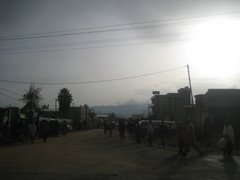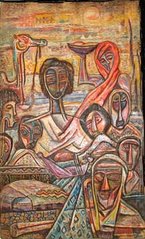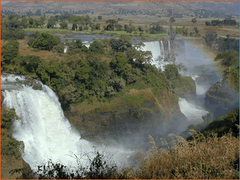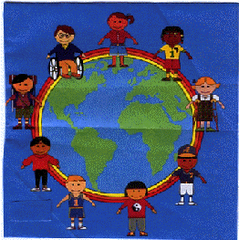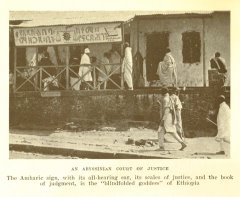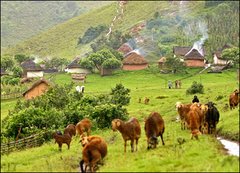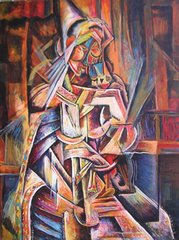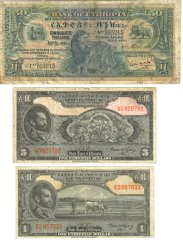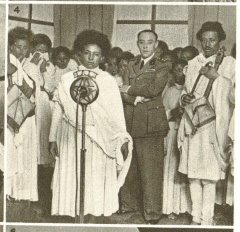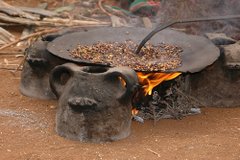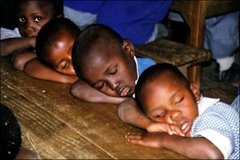Muslim-Christian Relationship in Ethiopia's Past
The Debre Birhan Selassie Ethiopian Orthodox Church in Gondar, Ethiopia (the x-capital: 1543-1855) is the only church of the 44 Orthodox Christian churches to survive the attack of the famous Imam Amhed Gragn. Inside the Selassie church, the walls are completely covered with colorful paintings depicting Bible stories and Ethiopian historical stories.
One of the paintings shows a naked man riding a horse that is being pulled by the devil. I wondered what this man could represent and my question was answered by the priest – the Muslims, as they were the chief enemy of the Christian state at the time these paintings were produced 320 years ago. And then he went on to tell me the legend which explains how this church survived the raiding of the Muslims led by Imam Amhed: the Muslim army rode around the city of Gondar putting fire to the churches; they arrived at the Selassie church and prepared to attack but Saint Michael came to earth in human form and with his swords fought the Muslim soldiers and then from the sky a swarm of bees came and drove away the army; and the church was left as it was. So, the legend says. When I got back to Addis, I decided it necessary, to open up my history book and read up on the Muslim-Christian relationship in Ethiopia, as its 300 year old relationship is still physically visible today.
7th century AD-through the Red Sea and Gulf of Aden, Islam was introduced to Ethiopia
9th century AD-Muslim states emerged: Dahlak, Shoa, Ifat, Adal, Fatagar, Dawaro, Dara, Arababani, Sharka, Bali, and Hadiya
896 AD - the earliest Muslim sultanate (state) founded by the Makhzumite Dynasty:Shoa, located in the hot lowland region on the left of the Awash River
Arabs got control of the port of Adulis-the most important trade port for the Aksum Empire
Result: moved primary port south to Zeyla on the coast of the Gulf of Aden
1285 AD-internal power struggle led to the decline of the Makhzumite Dynasty; the Walasma Dynasty defeated the Makhzumite dynasty and incorporated Shoa and all areas from Shoa to the port of Zeyla into their Muslim sultanate Ifat.
Now, Ifat was the strongest rival of Christian Highland and the main source of conflict was the need to control the Zeyla trade
1332 AD- Christian Highland defeated Ifat
1364 AD-the groups who took exile from Ifat to Harar established a new muslim sultanate-
Adal controlled most of the eastern lowland region from its political center Dakar, around present day Harar
Middle of 15th Century-because of drought, famine, and land pressures, nomadic Afars and Somalis in the Southeastern parts of the Ethiopian region and parts of the rest of the horn continued to move to Harar
this movement led to conflict between Afars, Somalis, and the Harar inhabitants- the Argobbas and the Hararis
1506 AD- Imam Ahmed Ibrahim al-Ghazi (Ahmed Gragn) became leader of Adal
He united the Afars, Somalis, the Argobbas and the Hararis towards a common objective- expansion; he prepared them for a large scale war; the goal was to get total control of the long distance trade and to conquer and occupy the rich central highlands
He was a good military commander and political leader
1508 AD-Emperor Libne Dingel ruled the Central Highland Christian Kingdom
He thought he could crush an power and he taxed the people heavily
1520 AD-Portuguese government sent an official delegation to the Christian Kingdom to form diplomatic relations with Ethiopia and the Horn of Africa
Emperor Libne Dingel requested Portuguese military assistance in war
The Ottoman Turkey empire was a foreign ally for the state of Adal-the Turks were interested in controlling Ethiopia and the rest of the Horn of Africa so they provided assistance to the Muslim sultanate Adal in Ethiopia
1529 AD- the Battle of Shimbra Kure-took place near present day Nazreth (Adama) – victory for forces of Adal with the help of Turkish musketeers from the Ottoman province of Yemen
1531 AD- Imam Ahmed's army occupied Dawara
1533 AD- Imam Ahmed's army were campaigning in Tigrai and other northern provinces
1540 AD- about 90% of Christian Kingdom was brought under Muslim army; Emperor Libne Dingel died
1541 AD- 400 Portuguese soldiers arrived in Ethiopia; they were received in the north by Seble Wongel-the ex-wife of the late Emperor Libne Dingel
1542 AD- Portuguese fought against Imam Ahmed's troops but were defeated and many killed
The remaining troops and Seble Wongel went to Gondar to meet with Gelewodeous – the son and successor of Libne Dingel
1543 AD- Battle of Woina Dega: the Portuguese troops and the troops of Gelewodeous combined to defeat the forces of Adal in Gondar
Imam Ahmed was killed and the defeated Adal troops and Bati del-Wonberra – the wife of Imam Ahmed fled back to Adal (Harar)
Source: Ayanu, Tesfaye and Ruffo, Yasin. (2007) "Ethiopian History" Advanced High School History











